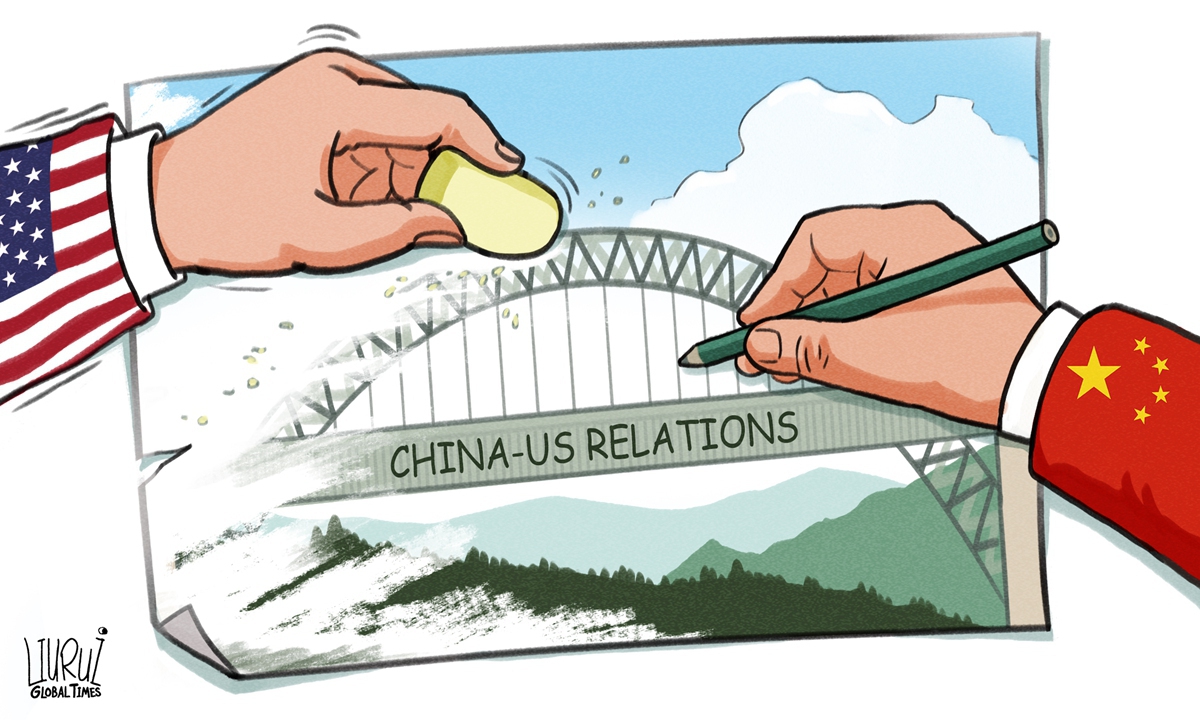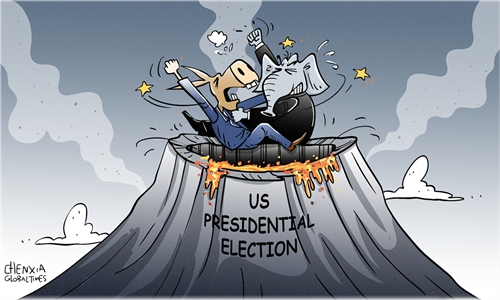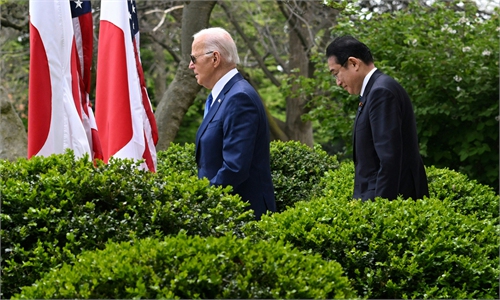US targets Chinese steel with 'overcapacity' fallacy amid escalating trade tensions; move casts great uncertainty on stabilizing bilateral ties

China-US relationship. Illustration: Liu Rui/GT
US President Joe Biden is reportedly pushing for tariffs to triple on Chinese steel and aluminum, a new sign that Washington - disregarding WTO multilateral rules, domestic inflation pressure and global supply chain stability - is targeting Chinese industries under the guise of "overcapacity" fallacy.
There is a chance that the tariff hike will be imposed, observers said, as Biden is in the rush to win more support in his presidential campaign from the steel industries, which account for a large number of voters in the swing states, and as the potential tariff rise could also pave the way for more ongoing probes into relevant Chinese advantageous industries such as shipbuilding and new-energy vehicle.
Biden's tariff threat adds to an array of escalating trade tensions between China and the US, and it runs in parallel with recent phased progress across multiple military, financial and economic aspects, which has been achieved through the two countries' intensive interactions.
Observers, while playing down the risks of another looming trade war, projected that bilateral trade tensions could grow wider ahead of the US presidential election in November, casting great uncertainty on whether the bilateral ties will maintain the stabilizing discourse. They stressed that the ball is in the US court to properly manage difference between the two sides, and more tellingly, to set aside its hegemonic and confrontational mind-set that has created numerous barriers to bilateral relations.
Biden's tariff threats
In a speech at the United Steelworkers headquarters on Wednesday, Biden called on US Trade Representative Katherine Tai to "consider tripling" the existing 7.5 percent tariff rate on Chinese steel and aluminum through a review of the Section 301 tariff rate on China "cheating," according to a CNN report. The section has been under review for four years.
The speech was reportedly made as part of Biden's economic competition pitch to Pittsburgh, a city in Pennsylvania that is in the heart of the American steel industry.
One of the intentions behind the tariffs increase is that Biden is considering an intense competition with Republican candidate Donald Trump in the run-up for US president. As a result, Biden is seeking to rally more union support in the swing states such as Pennsylvania, analysts noted.
In explaining the tariff, a US official said that it aims to "protect those investments and those workers from unfair exports associated with China's industrial overcapacity…which poses a serious risk to the future of the American steel and aluminum industry," the CNN report noted.
"The so-called Section 301investigation is a familiar playbook as the clause has been abused by the former Trump administration to justify tariffs in its trade war waged against China. This time, the Biden administration resorts the same tool again while disguising it with a recently invented bizarre 'overcapacity' tag," Gao Lingyun, an expert at the Chinese Academy of Social Sciences, told the Global Times on Thursday.
"Whatever the excuse is, it cannot cover up the US' flout of WTO rules and malicious attempt to suppress China," Gao said, stressing that the overcapacity allegation equates to an inherently pseudo-concept that lays bare how hegemonic Washington is.
In response to Biden's tariff rhetoric, China's Foreign Ministry spokesperson Lin Jian on Thursday said China has been asking the US to seriously respect the principle of fair competition, observe WTO rules, and immediately lift all trade protectionist measures against China.
Biden also called China "xenophobic" and said China "got real problems" in the speech. Responding to the remarks, Lin asked, "are those words meant for China or the US itself?"
China's Ministry of Commerce (MOFCOM) also voiced strong objection to the tariffs on Thursday.
"The US ignores international economic, trade order and rules, politicizes economic and trade issues, abuses the so-called Section 301 tariff review process, publicly demands arbitrary adjustments to tariffs on Chinese products, and passes on conflicts, which is a mistake on top of a mistake. Such a move does not help solve the problems faced by US industries," a MOFCOM spokesperson said.
In 2022, the WTO ruled that tariffs on steel and aluminum imports that were imposed by the US under former President Donald Trump in 2018 violate global trade rules. China Iron and Steel Association said at that time that relevant trade is based on "industrial complementary and fair market rules," which did not harm the US and benefited downstream clients at the same time.
In a similar vein, the USTR announced on Wednesday that it was launching a new Section 301 investigation into China's trade practices in the shipbuilding, maritime and logistics sectors. The move has immediately drawn strong opposition from China, with China's Ministry of Commerce issuing a statement overnight on Wednesday, lambasting the probe as a "mistake on top of a mistake."
Gao pointed out that there's a correlation between the investigations into China's steel industries and the downstream sectors such as shipbuilding and automobile.
"Tariffs on steel, which have a chance to be levied taking account of US' bad records in weaponizing trade tools, could pave the way for subsequent crackdown on industries which China has a competitive edge, but Biden could also be weighing the follow-up move more carefully as it would further fuel domestic inflation and meanwhile, send bilateral relations to a downward spiraling mode," Gao explained.
The imports of steel from China accounted for about 0.6 percent of total US steel demand, the CNN report said, quoting a US official as saying.
Escalating trade tensions
China's Foreign Ministry confirmed on Thursday the upcoming visit of US Secretary of State Antony Blinken to China. The visit adds to a flurry of recent interactions and dialogues between the world's two largest economies that have injected stability into bilateral relations.
Chinese Defense Minister Dong Jun held a video call with US Defense Secretary Lloyd Austin on Tuesday. And at the same day, the economic and financial working groups of China and the US held their fourth meeting in Washington DC. Last week, US Treasury Secretary Janet Yellen wrapped up a high-stakes six-day visit to China.
The mixed signal underscores that the US is taking a "two-dimensional" approach to China, that is to maintain the overall dynamic stability of bilateral relations yet relentlessly ratchet up pressure on China in areas where the US deems China as competitors, analysts said, while stressing that China - on the other hand - is prepared in both ways.
Washington will continue flaring up tensions throughout the US presidential election in November, with "more aggressive and confrontational" policies as both Biden and Trump wanted to cast themselves as "tough on China" to garner support amid US' toxic political environment, Li Haidong, a professor at the China Foreign Affairs University, told the Global Times on Thursday.
The trilateral summit held among the US, Japan and the Philippines last week vowed to enhance military ties to cope with "China's threats," which analysts said is another smearing against China that ignores US' deeds that undermine regional peace and stability.
Gao said Washington will play some "small tricks" that cast uncertainties on how the bilateral relations progress, though it will do a careful trade-off as they can't afford the risk of the conflicts veering into a broadside trade war.
Analysts warned that scapegoating China won't help Biden score the political points he desires, and more importantly, the incumbent administration won't easily walk away with stepped-up crackdown on Chinese industries.
In response to the 301 investigation, China's MOFCOM and Foreign Ministry vowed that the country "will take all necessary measures to firmly safeguard its own interests."
"China adheres to the basic principle of equality and reciprocity in its discourse with the US. It is likely that China will come up with countermeasures of 'similar scale' if US dares to engage in further unfair practices against China," Li said.
A more pragmatic solution to address China-US relations, according to Gao, is to reach consensus on "smaller areas of mutual interests," such as expanding direct air flights and launching joint initiative on anti-money laundering, before moving to other "larger areas" that the two sides hold divergence.
A fair and nondiscriminatory perception of China lays the basic framework for further exchanges between the two countries, and in this regard, observers said it is particularly important for the US to approach issues from the perspective of China-US economic and trade relations themselves, putting aside any hegemonic competitive mentality and politicization of economic matters.
Zhang Yiyi also contributes to the story.





